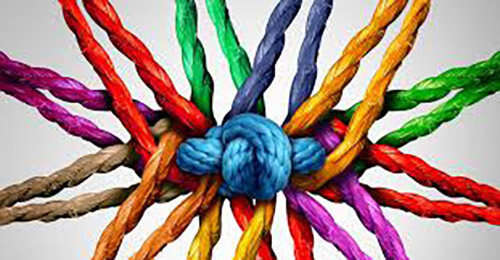
Recognizing complexity and seeing nuance are the first steps toward empathy. Having empathy means we understand each other across differences. It helps us recognize the “why” behind others’ actions. Digitally excoriating each other on social media or other public forums about masks, indoor gatherings or politics cracks our community apart and makes us unhappy. Blame it on algorithms or profit motive in these institutions, but we are in the power seat of how we interpret and react.
People typically see complexity in their own situation, but less so in others. I know why I logged in six minutes late for a call where I was presenting. My kid would not go to sleep until 9:30 p.m.; I was exhausted; the bathtub leaked; and IT forced me to restart my laptop at the worst moment.
But when a colleague suddenly said, “I have to go” 10 minutes into a video call that he had asked for, I had no space for empathy. He was asking me to do a training for his team that would take a few hours, but that’s clearly his role. He was being sneaky and taking advantage of me. I was seething. My gut reaction is that he’s lazy. He only needs to roll out of bed and walk across the hall to his swanky home office, complete with Herman Miller chair. He doesn’t have three young kids struggling with a range of emotions and inadequate childcare, or isn’t preparing for holidays on top of a demanding job. He’s a single guy in Los Angeles. I didn’t see complexity with this situation at all.
These unprecedented times have encouraged me to think more broadly and generously than in the past. In an ever-rotating circle of sleep-work-kids, my world has compressed considerably to just within the walls of my house. I miss Shabbat meals, shul and indoor playdates. To be clear, what I miss about indoor playdates is sending the kids tumbling down to the basement while the adults drop on the living room couches. We talk about ideas. We talk about salad dressing recipes. We unpack the dvar Torah and current events, relating them to our lives.
The richness of these moments isn’t just the socializing—although I miss that a lot—it’s because I heard perspectives of people different from me. Like many people, I tend to surround myself with friends who already agree with me politically, socially and religiously. That said, there’s still nuance; others who I love despite their politics; and perhaps most importantly for a discussion of complexity, those who I neither like nor agree with. I didn’t fully appreciate the gift of interacting with people with different viewpoints until it was ripped away 11 months ago.
My husband and I already agree on most ethical considerations and policies. We discuss the ethics of jumping the vaccine line, school openings and how to handle a shiva during COVID. That said, because we deeply know and love each other, we don’t have a different-enough worldview to push each other’s thinking. We already agree or have hashed out our differences enough times that I understand his thinking and choose to stand firm in mine. There’s nothing new or nuanced here. I listen to podcasts and read to get some novelty and new perspectives, but these activities are not collaborative. They are passive. I’m absorbing others’ opinions and stories, but don’t turn the topics over and discuss various angles. Plus, I’m likely just subscribing to media that cements my thinking.
Regarding my Californian colleague, I decided to be generous and assume there’s more complexity. It turns out his power was cut, his ex-wife is trying to extract more money in their divorce settlement, and his work performance is struggling. I didn’t find all this out from a climactic, tear-laden tell-all call. Instead, these nuggets came from other discussions and spread over time. There is nuance. There is complexity. I still don’t particularly like him personally, and will avoid working with him for various reasons. That said, I have more empathy for him and will endeavor to see complexity. I also am less emotionally stirred when I see his name pop up over email or his face in a video call. I’m happier.
My ask of you is to be thoughtful about empathy. Push yourself to be generous with interpretations and see complexity in others’ situations.
Rachel Bernstein is a CIO Data Insights Senior Director for Gartner, Inc. She lives in Teaneck, is married to a marvelous husband, and has three curious, happy and active children. She hopes to improve society one thoughtful, personal conversation at a time.












